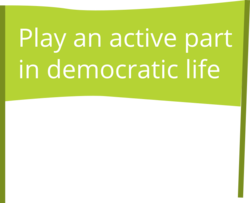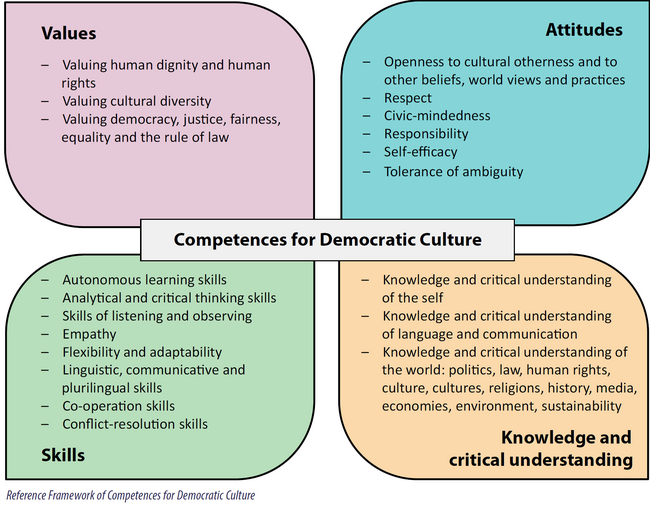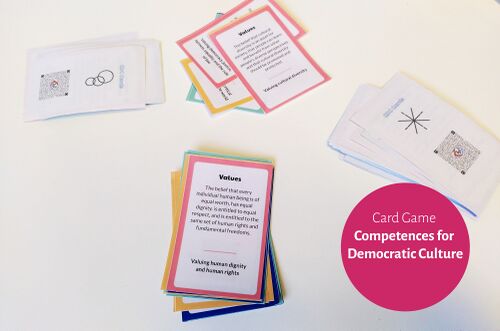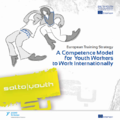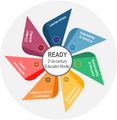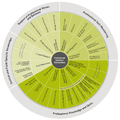In contrast to other (transversal) competences, they refer to democratic values which are not self-explanatory. For example, involvement can be understood in a different way - some groups of people involve in illegal practices and neglect democratic principles, others apply a pedagogy of proactivity in non-democratic contexts.
Contents
- 1 Contributing to a Civic Culture
- 2 Democratic Culture
- 3 Social Individuals
- 4 Learning to Learn, toward Autonomy
- 5 Change Orientation
- 6 Facilitating Civic Competence
- 7 The Role of Facilitators and Teachers
- 8 References
Contributing to a Civic Culture
People become active in society in order to have an impact on decision-making and in this way they contribute to a specific "civic culture". With Almond/Verba we may define civic culture as all "attitudes toward the political system and its various parts, and attitudes toward the role of the self in the system."[1]
While Almond/Verba introduce a distinction between the political and other social subsystems (like economical, religious, civic, etc.), other theoreticians find it more useful to broaden the definition including time and the dynamics of social processes, as well as to reflect on the 'bigger picture' by taking into account society as a whole: "In exploring the origins of a political culture it is necessary, for example, to treat both the historical development of the system as whole and the life experiences of the individuals who currently embody the culture."[2]
Therefore, political and civic culture describe the internal map of a society which includes attitudes, traditions, institutional cultures, passions, structural decisions. "[...]The traditions of a society, the spirit of its public institutions, the passions and the collective reasoning of its citizenry, and the style and operating codes of its leaders are not random products of historical experience but fit together as a part of a meaningful whole and constitute a intelligible web of relations."[2]
In this perspective citizens and their actions are embedded within a specific civic culture and thus they contribute to a bigger aim: to co-create civil society, develop private and collective attitudes, as well as to co-create political and economical systems reflecting their imagination of society and of living together.
Democratic Culture
Competences for democratic culture
"The competences that need to be acquired by learners if they are to participate effectively in a culture of democracy and live peacefully together with others in culturally diverse democratic societies."
Council of Europe, 2018, p. 11[3]
Reference Framework Competences for Democratic Culture (RFCDC)
The Council of Europe's model of the competences required for democratic culture and intercultural dialogue. In the full version, 447 descriptors describe the 20 competences more detailed. They are clustered for basic, intermediate and advanced competence levels of learners.
Values
- Valuing human dignity and human rights
- Valuing cultural diversity
- Valuing democracy, justice, fairness, equality and the rule of law
Attitudes
- Openness to cultural otherness and to other beliefs, world views and practices
- Respect
- Civic-mindedness
- Responsibility
- Self-efficacy
- Tolerance of ambiguity
Skills
- Autonomous learning skills
- Analytical and critical thinking skills
- Skills of listening and observing
- Empathy
- Flexibility and adaptability
- Linguistic, communicative and plurilingual skills
- Co-operation skills
- Conflict-resolution skills
Knowledge and critical understanding
- Knowledge and critical understanding of the self
- Knowledge and critical understanding of language and communication
- Knowledge and critical understanding of the world: politics, law, human rights, culture, cultures, religions, history, media, economies, environment, sustainability
Source: https://www.coe.int/rfcdc [3]
Explore the Competences for Democratic Culture:
Under democratic perspective the education goal in regard to citizenship is that people from all ages, all social backgrounds, and representatives of all social systems need to develop such civic competences. Different definitions therefore prioritize different aspects. Of course, what societies understand by "citizenship," i.e., what participation is desired and how civil rights should be structured, varies globally. For us, the concept of citizenship is closely linked to democracy and democratic coexistence.
Definitions: Citizenship Education
Find here an overview of how EU, Council of Europe, OECD or UNESCO look at citizenship education.
Relevant Competence Frameworks for Learners...
LifeComp
EU's framework for the Personal, Social and Learning to Learn Key Competence
DownloadReference Framework of Competences for Democratic Culture (RFCDC)
Council of Europe's holistic competence framework for Education for Democratic Citizenship and Human Rights.
DownloadDigComp 2.2: The Digital Competence Framework for Citizens
2022 edition of the EU framework
DownloadEntreComp
The EU Entrepreneurship Competence Framework
DownloadGreenComp
The European sustainability competence framework
DownloadPISA Global Competence Framework
An OECD Framework to "global competence"
DownloadDeSeCo
OECD project to the definition and selection of key competences
OnlineEducation for Sustainable Development Goals - Learning Objectives
designed by UNESCO education sector
DownloadEuropean Qualification Framework
EU's translation device between different qualifications systems and their levels.
Download
...and for Educators
Digital Competence of Educators
What has digital competency to do with you as a teacher or educator?
DownloadETS Competence Model for Trainers Working at International Level
SALTO Training and Cooperation's framework for educators
DownloadA Competence Model for Youth Workers to Work Internationally
SALTO's competence model for international facilitation DownloadYouth work competence
Council of Europe's Portfolio Tool on youth work competence
OnlineRFCDC Teacher Reflection Tool
for the Council of Europe's Competences for a Democratic Culture (RFCDC)
Download & OnlineREADY
Reference model for Educators' Activities and Development in the 21st-centurY by ETF
OnlineLearning for the future
Competences for education for sustainable development by UNECE
DownloadCurriculum globALE
A global competency framework for adult educators by DVV International, German Institute for Adult Education, International Council for Adult Education and UNESCO Institute for Lifelong Learning Downloadgreta Professional Teachers Competence Model
in Adult and Continuing Education
WebsiteDigital competence toolbox for youth work
Verke's toolbox includes criteria for digital competences, a self-assessment tool and also an online test.
online
Social Individuals
We emphasize on four very broad aspects of individual competences that seem to be crucial for the functioning of a democratic civil society. This implies that other democratic attitudes or structures within the civil society are based on these attitudes and competences.
In his historic reflections on “Democracy and Education,” John Dewey cited two qualitative criteria for a citizen's “democratic” education. First, he states that people must have the ability “to receive and to take from others,” sharing a huge number of common values and interests. Acquiring civic competences means creating inclusive and equal communication and structures – giving new colleagues and other interested parties the opportunity to gather information, to participate, and to discuss their own concerns.[4]
Second, Dewey pointed out that democratic societies have to "break down external barriers; to bring peoples and classes into closer and more perceptible connection with one another". People need to "change their social habits" to develop the "fullness and freedom" with which a democratic group seeks interaction with other groups.
In this perspective, civic education and civil engagement are a learning space, where we can try to change our habits and to learn to share and also to negotiate diverging interests.
The Ability to Bonding and Bridging Social Groups
Robert Putnam uses the term “social capital” to describe how a society’s interpersonal communication leads to positive outcomes: “to call attention to the ways in which our lives are made more productive by social ties.” [5] Social capital is describing the value which is created through interaction and linkage between citizens. One insight deriving from this approach is, that a society needs not to look only to its mechanisms to gaining economic growth. It has also to take care about a vivid civil society, the space, where citizens voluntarily and deliberate organize themselves from the grassroots.
Putnam identified two types of social capital. Bonding social capital is good for “undergirding specific reciprocity and mobilizing solidarity.” It is generated by joining existing relatively homogeneous structures or sub-systems.
Bridging social capital is generated by joining a heterogeneous social environment, “for linkage to external assets and for information diffusion.”[6] In order to change something, one must step outside one’s own group and solicit others’ consent.
Respecting and Practicing Human Rights
One basic assumption of humanism is that all people and creatures have a special value and that we should harbour fundamental respect towards all living things. Therefore, we see each individual’s rights and opportunities for social participation as the focus of our moral system. We consider individuals to be seeking self- realization, to be in touch with the purposes and beliefs behind their behaviors and their intrinsic motivation is activated when they feel these behaviors and beliefs to be in harmony.
Civic Competence is directly related to Human Rights inline with the Universal Declaration of Human Rights which says: "Education shall be directed to the full development of the human personality and to the strengthening of respect for human rights and fundamental freedoms. It shall promote understanding, tolerance and friendship among all nations, racial or religious groups, and shall further the activities of the United Nations for the maintenance of peace."[7]
Learning to Learn, toward Autonomy
In order to achieve this, learners need to be able to learn from experience, failures, or challenges (together). Furthermore, they require educators which are giving them enough space for such ‘learning by doing’ including learning to draw conclusions out of their activities and to plan their further steps of learning.
In the EU context this crucial competence is defines as Life Competence: The "personal, social and learning to learn competence". The EU competence framework for this competence is called LifEComp.[8]
More: Learning to Learn
Change Orientation
Educational approaches in active citizenship education aim to instigate individual development and/or social change. For this reason, this idea is in tension with approaches that aim to adapt to existing conditions. This is not to say that adaptability cannot also be a relevant competence and building block of transformative pedagogy. Ultimately, however, transformative pedagogy opens up the possibility for people to be able to overcome a personal or societal condition.
Change-oriented education
Change-oriented adult education encompasses an approach, philosophy and set of teaching and learning methods that seek to create individual and/or social change.
Learners can also move beyond individual transformation to a collective empowerment based on critical awareness, new ways of thinking, and active participation.
This model facilitates a process of conscious realization for learners as they work together taking action, including potential acts of resistance, towards a more democratic, equal and ethical world.
Source: Manninen, Jetsu & Sgier (2020)[9]
Like a competence model itself puts emphasis of practical qapplication of experience and knowledge, a civic competence model should include the aspect of engagement and initiative. For democratic education this implies, that not only democratic teachers but especially the learners themselves are playing a crucial role. Civic education in that sense supports citizens in organizing themselves (self-organization) and actively climbing the ladder of participation.
The EntreComp and GreenComp Frames
Most clearly the EU's EntreComp framework is emphasizing on the crucial role of initiative: "Entrepreneurship is when you act upon opportunitiesand ideas and transform them into valuefor others. The value that is created can be financial, cultural, or social."[10]
The term entrepreneurship itself is in the context of civic education sometimes misleading, since the main goal of the framework is not economic literacy or ability. Rather one could speak of proactivity, active citizenship, successful initiative, or participation, which all lead in consequence to social, cultural, or economic impact - in the best case also to social innovation.
Also GreenComp is setting one focus on social respectively environmental impact by addressing political agency, collective action and individual initiative.
Facilitating Civic Competence
Democracy-related training and education supports citizens as individuals, in a group or on institutional level to actively shape their society inline with democratic principles. Activities in the field of Active Citizenship Education...
- work respectfully on individual competences and support individuals to discover and describe their visions and needs.
- ensure clarity and a greater effectiveness by giving individuals and groups a view of systemic connections, to describe their actions and influence on wider society as social impact.
- promote and discuss democratic principles and how they are or should be included in specific cases, in rules or relations. Particularly, by making the democratic attitude of the individual the focus of training.
- help develop Robust Civility (T. Garton Ash) as a condition of democratic public life. Beyond beeing able to make use of free speech, citizens should also be encouraged to manage conflicts peacefully even in challenging circumstances, and to transform political hostility into pacified disagreement.
- encourage dialogue across systemic and social boundaries, help forge new coalitions, generate bridging social capital and therefore contribute to social trust.
- focus on active participation and the ability to climb the higher steps of the ladder of participation.
- provide media literacy and digital competence, helping with the use of communication technology and how to process and produce information (critically). Furthermore, prepare citizens on making use of digitalization as a fundamental social process.
The Role of Facilitators and Teachers
What is your priority? What do you think about democracy, civil involvement, and social change? Facilitators and teachers are themselves important parts in citizenship education. As responsible and democratic citizens they practise education in a democratic way and bring practices in their organizations and educational institutions. Thus contributing to a more democratic culture. More than any other subject, democracy learning relies on empowering and democratic minded facilitators.
References
- ↑ G. Almond, S. Verba: The Civic Culture. Political Attitudes and Democracy in Five Nations, Princeton 1963
- ↑ 2.0 2.1 L. Pye, S. Verba (Ed.): Political Culture and Political Development; Princeton, 1972 (2. edition) ;p.7
- ↑ 3.0 3.1 Council of Europe (2018). Reference Framework Competences for Democratic Culture. Volume 1 - Context, concepts and model. Further: Vol. 2; Vol. 3 | online
- ↑ John Dewey: The Democratic Conception in Education; 1916; chapter 7
- ↑ R. D. Putnam: Bowling Alone. The Collapse and Revival of American Community; New York 2000; p.19
- ↑ Putnam; p. 22
- ↑ United Nations: Universal Declaration of Human Rights. Art. 26 (2)
- ↑ Sala, A., Punie, Y., Garkov, V. and Cabrera Giraldez, M., LifeComp: The European Framework for Personal, Social and Learning to Learn Key Competence, EUR 30246 EN, Publications Office of the European Union, Luxembourg, 2020, ISBN 978-92-76-19417-0, https://doi.org/10.2760/922681], JRC120911.
- ↑ Manninen, J.; Jetsu, A; Sgier, I.(2020). Change-oriented aduklt education in the fields of democracy and digitalization. Project: FutureLabAE - change-oriented adult education
- ↑ Bacigalupo, M & Kampylis, P. & Punie, Y. & Van den Brande, L.. (2016). EntreComp: The Entrepreneurship Competence Framework. Luxembourg: Publication Office of the European Union; EUR 27939 EN. https://doi.org//10.2791/593884
Nils-Eyk Zimmermann
Editor of Competendo. He writes and works on the topics: active citizenship, civil society, digital transformation, non-formal and lifelong learning, capacity building. Coordinator of European projects, in example DIGIT-AL Digital Transformation in Adult Learning for Active Citizenship, DARE network.
Blogs here: Blog: Civil Resilience.
Email: nils.zimmermann@dare-network.eu
